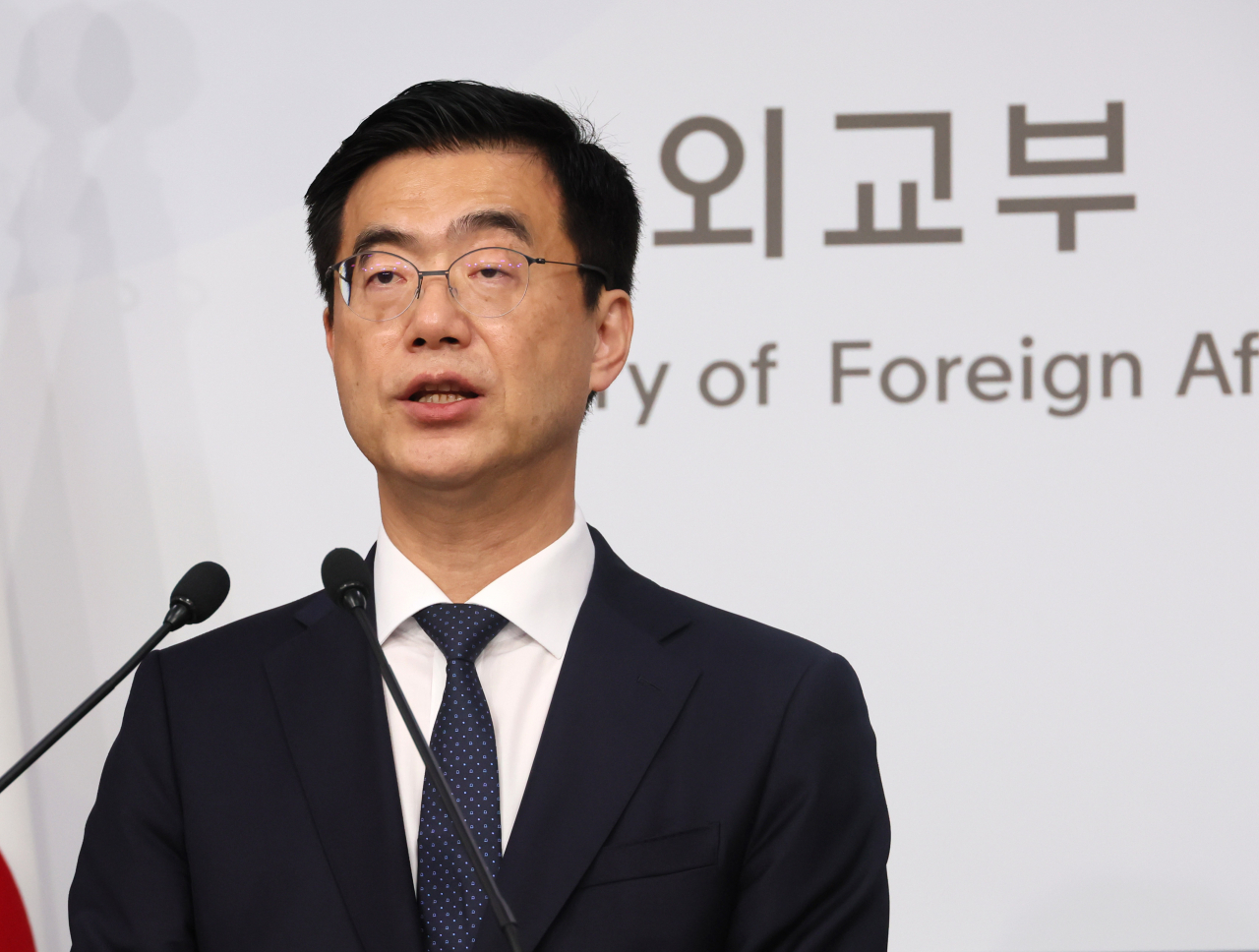 |
Foreign Ministry spokesperson Lee Jae-woong delivers South Korea’s official response to Russia’s support for Pyongyang’s unilateral claim of a South Korean incursion, at the ministry building in Seoul on Tuesday. (Yonhap) |
The South Korean government on Tuesday expressed "deep regret" over the Russian Foreign Ministry’s defense of North Korea’s unilateral claims that South Korea had sent drones carrying anti-North Korean propaganda leaflets into Pyongyang.
"(The South Korean government) expressed deep regret over the Russian Foreign Ministry’s defense of North Korea’s unilateral claims, the facts of which remain unverified, while bringing up sovereignty violations and interference in North Korea’s internal affairs," the Foreign Ministry in Seoul conveyed the government’s stance on its behalf.
"The government also urged Russia to explain why it took no action during several drone provocations against South Korea, which were previously confirmed to have been carried out by North Korea," according to the government's statement.
The Yoon Suk Yeol government responded on Monday to the Russian Foreign Ministry’s public support for the Kim Jong-un regime's repeated unilateral claims -- made since Friday -- that South Korea had sent drones into Pyongyang’s airspace on three occasions, specifically on Oct. 3, 9, and 10, under the cover of night to scatter large volumes of anti-North Korean propaganda leaflets.
Russian Foreign Ministry spokesperson Maria Zakharova said, "Such actions by Seoul can only be interpreted as a flagrant violation of the DPRK’s sovereignty and interference in its internal affairs," referring to North Korea by the acronym of its official name, the Democratic People's Republic of Korea.
"The South Korean authorities should take Pyongyang’s warnings very seriously and cease further escalation on the peninsula through their reckless and provocative campaign, which exacerbates tension and could lead to actual armed confrontations," Zakharova added on tensions escalation on the Korean Peninsula.
The South Korean government on Tuesday refuted that "It is evident that full responsibility for the recent series of incidents lies with North Korea, which has been threatening its fellow countrymen with nuclear weapons and engaging in aggressive rhetoric and actions without hesitation."
"If Russia, as a permanent member of the UN Security Council, seeks to play a constructive role in promoting peace and stability on the Korean Peninsula, it must restrain North Korea from its unilateral and deliberate actions that escalate tensions and persuade North Korea to return to the path of dialogue and diplomacy that we have proposed," the South Korean government added.
The Foreign Ministry in Seoul on Tuesday responded to Russian media reports stating that President Vladimir Putin had submitted a treaty on comprehensive strategic partnership between Russia and North Korea, signed in June in Pyongyang, to the State Duma for ratification.
"As North Korea continues to unilaterally and deliberately escalate tensions on the Korean Peninsula, the South Korean government is closely monitoring developments with concern over Russia's advancing ratification of the Russia-North Korea treaty," the ministry said.
South Korea's Foreign Ministry urged “Russia to halt any illegal military cooperation with North Korea,” adding, “We will respond sternly, in coordination with the international community, to any actions that threaten our security.”
Russia factor
In an interview with The Korea Herald on Tuesday, Hyun Seung-soo, vice president of the Korea Institute for National Unification, stated, “Kim Jong-un is able to escalate provocations and intensify tensions on the Korean Peninsula because he has the solid backing of Russia.”
Hyun noted that Kim is closely aligning North Korea’s strategy with Putin’s global agenda, effectively modeling the regime’s approach on Russia’s playbook. A term frequently used in recent Russian discourse is “fortification,” reflecting Putin’s ambition to transform Russia into a stronghold in its confrontation with Western civilization, cementing its position as a dominant force on the global stage.
“North Korea’s efforts to cut ties with South Korea and fortify its borders are closely tied to Putin’s global strategy,” Hyun said.
The South Korean military announced that explosions occurred along the Gyeongui and Donghae line roads around noon on Tuesday, with the intent believed to be blocking key inter-Korean connecting roads.
North Korean Army's General Staff only officially announced the start of operations to block all roads and railways to South Korea, along with plans to fortify their side with strong defensive structures, on Wednesday -- before making claims of a drone incursion.
Notably, the announcement coincided with North Korean state media’s report on the Oct. 7-8 Supreme People's Assembly session, which omitted any reference to anti-shared ethnicity rhetoric or the inclusion of "two Koreas" in the hostile clauses of its newly approved constitutional amendments.
"Kim Jong-un has adopted Russia’s more aggressive approach — resorting to nuclear threats at times and fostering global instability to achieve strategic objectives while continuing to confront the US and the West. As a result of embracing this strategy, the North Korea-Russia alliance has now effectively reached the level of a military alliance,” Hyun said.
“I believe the recent developments are largely made possible by the close relationship between Russia and North Korea, and this dynamic is likely to persist, as it relies more on Russia’s global strategy -- which is unlikely to change -- than on North Korea’s intentions.”






![[Herald Interview] How Gopizza got big in India](http://res.heraldm.com/phpwas/restmb_idxmake.php?idx=644&simg=/content/image/2024/11/20/20241120050057_0.jpg)
